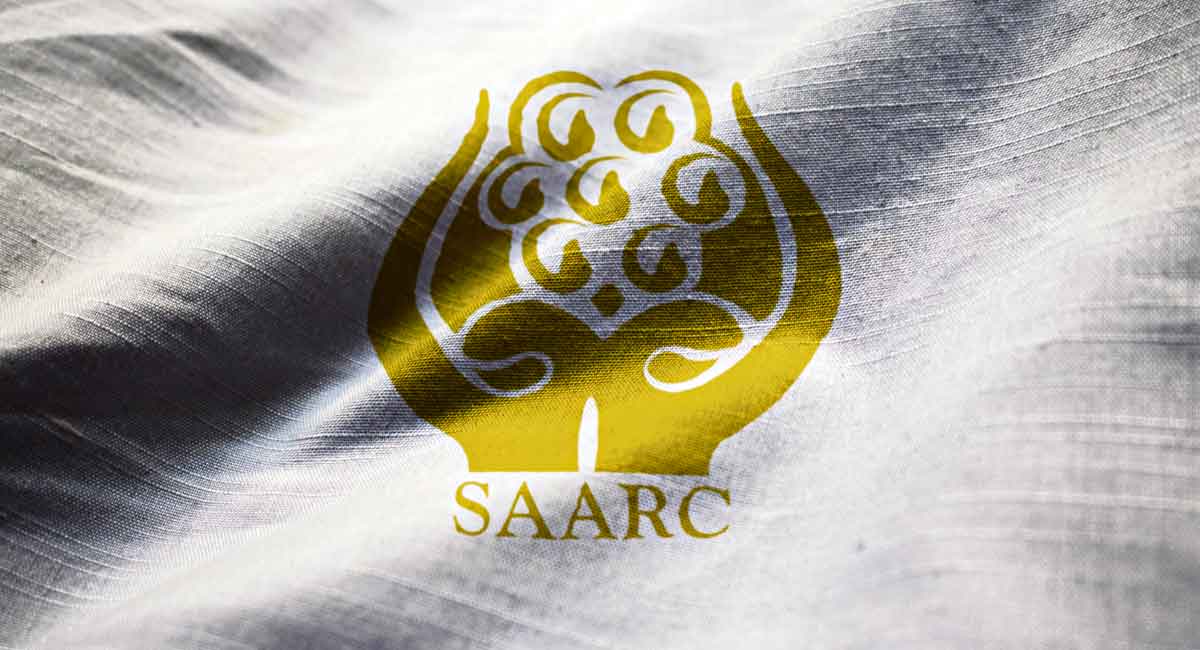Printed: Printed Date – 12:45 AM, Thu – 28 July 22

By Dhananjay Tripathi
The final couple of years has not been good for South Asia, which, in all respects, stands divided. Politically and economically, South Asia is thought to be one of many world’s least built-in areas. This post-colonial, post-partition area has failed to face united regardless of establishing the South Asian Affiliation For Regional Cooperation (SAARC) in 1985. The ineffectiveness of SAARC is estimated by the truth that hardly any specialists wish to endorse it, intellectually or in any other case.
The literature on South Asian regionalism is filled with pessimistic commentaries and solely reflection on impediments just like the rivalry between India and Pakistan and Indian regional hegemony. On cautious evaluation, we will even simply divide two faculties of thought providing completely different causes for the shortage of cooperation in South Asia.
Two Colleges of Thought
The primary one is dominated primarily by Indian and Pakistani specialists who wish to blame enmity between these two nations for the battle of SAARC. Some current examples are the SAARC Motor Car settlement that India enthusiastically backed, however it did not get consent from Pakistan on the 2014 SAARC summit. Essentially the most obtrusive of all is the failure of South Asian nations to satisfy for the SAARC summit after 2014, as India and different nations wished to register their protest towards Pakistan for supporting terrorism. In 2016, the SAARC summit was scheduled in Islamabad, however after a significant terror strike in India by a Pakistan-based militant organisation, India expressed anguish and refused to attend it.
Whereas accepting the primary argument, the second faculty provides that South Asian regionalism is tough as a result of the area has energy asymmetry. In contrast to Europe or Southeast Asia, the place energy variations between nations are usually not a lot, India dominates by way of financial system, geography, demography and strategic-depth in South Asia. Pakistan is the one nation within the area that comes a little bit near matching the Indian navy energy. India and Pakistan have nuclear weapons, however India is taken into account superior in typical navy phrases.
Briefly, there may be the idea that India will profit from regional integration at the price of small nations in South Asia. Subsequently, one can not see a lot eagerness for regionalism in several capitals of South Asia.
South Asianness: The Diminishing House
There’s hardly any robust regional group that likes to propagate the thought of South Asianness. Truthfully, even for a robust proponent of regionalism, it’s powerful to counter the dominant arguments that paint a dark image of South Asia. For sure, South Asia in the previous couple of years has been quick shedding its attraction among the many academia, policymakers, and the worst is even among the many small minority of regional activists.
We don’t discover voices just like the late Asma Jahangir and Kamala Bhasin. They dared to speak of peace and partnership between India and Pakistan and invoke the thought of South Asia in public boards. Furthermore, the house for regional activism has shrunk over time, and politically this neighborhood has confronted troubles of their respective nations.
Latest Occasions: Rethink Regionalism
The following logical query – is South Asia an irrelevant class of debate, and we will transfer in different instructions like sub-regionalism. Theoretically, sub-regionalism shouldn’t be assumed to counter regionalism; in different phrases, it solely enhances the latter. It’s like completely different routes taking us to the identical vacation spot. Though, regardless of high-pitched propaganda for a number of sub-regional initiatives, it’s powerful to current information proving their efficacies besides in political discourses. South Asia continues to be essentially the most related class for the nations of the area, and it can’t be ignored.
The current disaster within the area, just like the one in Sri Lanka and Afghanistan, re-establishes that South Asia requires some sturdy organisation that may reply at instances of humanitarian disaster. Each Sri Lanka and Afghanistan require beneficiant monetary assist. The tragedy is that South Asia as a area shouldn’t be within the place to supply substantial assist to any of those nations. On the South Asian stage, New Delhi is predominantly engaged in reaching out to the individuals of Sri Lanka and Afghanistan. The Indian strategy to those crises is exemplary and deserves applause; nonetheless, a couple of critics take into account it unilateralism impressed by future political agenda.
Within the current previous, the China query, hyper-projection of Indo-Pacific, the USA-China competitors and in all of those, the function of India is overly mentioned. In consequence, some analysts in South Asia began defining modern Indian overseas coverage as Western-centred. Thus, India’s assist to Sri Lanka is examined from the angle of New Delhi’s effort to counter China within the island nation. Equally, the Indian transfer to open a channel with the Taliban to supply help to Afghanistan is described as part of a bigger technique to preserve a verify on Pakistan and China.
Whereas there isn’t any have to be defensive on good deeds, India must be diplomatically extra considerate on these points. India is a significant difficulty within the home politics of all these nations. Bear in mind the current public protest towards India within the Maldives by the opposition political events. New Delhi shall be conscious of such public outrage in South Asian nations. Thus, India taking a regional street by making each South Asian nation a stakeholder within the course of will likely be extra beneficial for its public picture within the area. The problem is {that a} part of Indian overseas coverage bureaucrats stays oblivious of the area and unwilling to reject the geostrategic framework.
To repeat my earlier argument on this article and others revealed earlier, this can be a historic juncture for South Asia and India. The neighbourhood first coverage is prioritised, India is transferring confidently on a number of overseas coverage fronts, and a little bit extra consideration for South Asia can carry actual change. For different South Asian nations, together with Pakistan, regionalism is a viable resolution to a variety of their issues.

(The writer is Affiliate Professor, Division of Worldwide Relations, South Asian College, New Delhi)